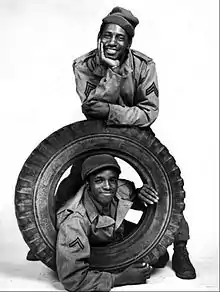Stu Gilliam
Stewart Byron "Stu" Gilliam (July 27, 1933[1][2] – October 11, 2013) was an American actor and stand-up and TV comedian.
Stu Gilliam | |
|---|---|
 Gilliam (top) in Roll Out, 1973 (with Hilly Hicks) | |
| Born | Stewart Byron Gilliam July 27, 1933 Detroit, Michigan, U.S. |
| Died | October 11, 2013 (aged 80) |
| Occupation | Actor, comedian |
| Spouse(s) | Vivian White Baravalle
(m. 2007) |
Biography
Stewart Byron Gilliam was born in a middle-class area of Detroit, the grandson of a church minister. He left home at the age of 14 to perform with a circus as ventriloquist in state fairs, then after a few years began to appear in clubs in Chicago. During his two-year service in the Korean War, he entertained troops as a ventriloquist. In the 1950s/60s he performed his act in clubs nationwide with black audiences, including the Apollo Theater in New York City. He sometimes performed for mixed-race shows, but in Southern states was prevented from appearing onstage at the same time as white performers. Finally, the Playboy Club circuit placed him before largely white crowds, including in the South.[2]
Gilliam appeared on national television in the 1960s, including The Ed Sullivan Show, Playboy After Dark, and The Dean Martin Show. He did stand-up work and TV and film appearances in the 1960s and 1970s. In 1968, he was paired with Don Adams and Robert Culp in Get Smart as Agent Samuels (really Kubacek, a double agent in deep disguise) in "Die, Spy", a spoof of the television series I Spy. He was the voice of Freddie "Curly" Neal on the Hanna-Barbera cartoon series Harlem Globetrotters in the early seventies.
He married Vivian Baravalle in 2007 and moved to her residence in Czechia. He died of a heart attack in České Budějovice, Czech Republic on October 11, 2013, aged 80.[1] He had been suffering from lung cancer and COPD. He is buried in Borsov nad Vltavou, Czechia.[2]
References
- Social Security Death Index dates of birth and death, datalounge.com; accessed July 21, 2018.
- "Stu Gilliam, comedian-actor, taught the Faith enthusiastically". The American Baháʼí. January–February 2014. Archived from the original on May 14, 2019.
External links
- Stu Gilliam at IMDb